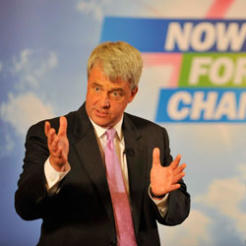Charities remain concerned about the lobbying bill, despite government agreeing to make sure what is defined as election campaigning does not catch legitimate charitable activity.
Last Friday, Andrew Lansley, leader of the House of Commons met with Sir Stuart Etherington, chief executive of NCVO and its head of policy Karl Wilding, to discuss the sector's concerns with the controversial lobbying bill.
One concern had been that the new lobbying bill introduced a wider definition of what could be considered election campaigning. Charities said it could prevent legitimate charitable activity.
Following the meeting, government said it would drop plans to change the way campaign spending in the run-up to an election by organisations other than political parties, would be defined.
A government statement read: “After discussions with NCVO and others, and in order to make the point as clear as possible whilst maintaining the reforms to electoral law, we now propose to revert to the situation as set out under existing legislation, which defines controlled expenditure as expenditure 'which can reasonably be regarded as intended to promote or procure electoral success'."
Christian Aid: spending threshold in bill still problematic
However, despite this concession, Christian Aid says it remains “deeply concerned” that the lobbying bill could place huge and complex demands on charities if they do not want to fall foul of the law during election time.
Barry Johnston, Christian Aid’s senior political adviser, said the government’s concession on how to describe campaigning activities did not address the broader concerns of the charitable sector.
"As it still stands, the bill could lower the threshold of spending by all organisations, including charities, for an entire year before an election, in various ways – such as at hustings, in the holding of public talks, and on adverts calling on all parities to adopt certain policies.
"Once past a set threshold, an organisation could have to register as a ‘third party’ which would bring with it hugely onerous reporting requirements including, once parliament has dissolved, weekly accounting of monies spent organisation wide."
The Transparency of Lobbying, Non-Party Campaigning and Trade Union Administration Bill proposes to make it a crime to spend more than £390,000 on campaigns affecting elections – including local and European.
Johnston continued that for Christian Aid it would mean different thresholds for campaigning work across England, Scotland and Wales, creating a major undertaking given the way in which staff split their time across different functions. Coalition working would bring further difficulties, he said.
NCVO moots arguing for withdrawal of part two of bill
Meanwhile NCVO, which welcomed government’s plans to abandon the change to the test of what constitutes non-party campaigning, also said it remained concerned with the lobbying bill.
A spokesman said: “The proposed definition of controlled expenditure remains neither clear nor workable for non-charitable voluntary organisations. We remain similarly concerned that the expenditure thresholds proposed in the new bill will damaging, particularly for small community groups that are not charities. These must be restored at current levels. The question of how to sensibly regulate groups working in coalition remains to be addressed.
“If a revised test of what constitutes non-party campaigning by charities, together with a clear definition of controlled expenditure and unchanged expenditure thresholds, cannot be achieved, we will continue to argue for the withdrawal of part two of the bill.”
Acevo calls for bill to be delayed
Sir Stephen Bubb, chief executive of Acevo, has called for the bill to be taken "back to the drawing board" and for charities to be given greater say in how it is ultimately formed.
"I am pleased that the government has recognised the extent of charities’ concerns regarding the restrictive proposals in the bill. However, its proposed changes do not go far enough. The bill as it stands will still create unnecessary uncertainty, bureaucracy and cost for charities seeking to engage with public policy debate. Many charities have told me they remain concerned about its effects.
"The government should listen to the Political and Constitutional Reform Committee's recommendation, and go back to the drawing board. We shall offer our help and cooperation, if the government allows us time, to design a bill that properly restores the public's trust in politics.”
Graham Allen, chair of the select committee examining the bill, has said the legislation should be put on hold until next year so it can be redrafted by a special committee.










